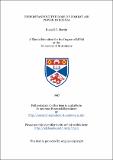Understanding the role of combat air power in Bosnia
Abstract
Fighting began in the Socialist Federal Republic of Yugoslavia in June 1991 and in Bosnia-Herzegovina in March 1992. Combat air power was introduced to the Bosnian conflict in April 1993. Its use in the Persian Gulf War in 1991 had raised the public and policy makers' expectations of the omnipotence of this weapon in dealing with an increasingly unstable world in the aftermath of the Cold War. However, combat air power did not initially perform in the Bosnian quagmire with the success that post-Gulf war euphoric politicians anticipated and as such cast doubts on its omnicompetence. Two phases were identified in the Bosnian conflict with specific regard to the use of combat air power. The first phase (Operation Deny Flight: April 1993-August 1995) was identified with a failure of the use of combat air power, the second (post August 1995) with its success. The fact that the technical capability of combat air power had not changed in any way, nor the physical environment, lead to the hypothesis that combat air power per se was not to blame for the earlier failure. Rather, the inability of policy makers' to appreciate the context within which air power needed to be applied to be successful, and to provide solid political leadership with an overall strategy and clear objectives, was. As a result of the contemporary nature of the conflict there was very little literature on the dissertation title. Therefore, much of the research has been drawn from journals, newspapers and where possible, military documents.
Type
Thesis, MPhil Master of Philosophy
Collections
Items in the St Andrews Research Repository are protected by copyright, with all rights reserved, unless otherwise indicated.

